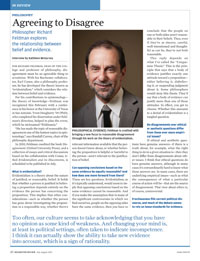In Review
 PHILOSOPHICAL EVIDENCE: Feldman is credited with bringing a new focus to reasonable disagreement through his work on the theory
of evidentialism. (Photo: Adam Fenster)
PHILOSOPHICAL EVIDENCE: Feldman is credited with bringing a new focus to reasonable disagreement through his work on the theory
of evidentialism. (Photo: Adam Fenster)For Richard Feldman, dean of the College and professor of philosophy, disagreement must be an agreeable thing to scrutinize. With his Rochester collaborator, Earl Conee, also a philosophy professor, he has developed the theory known as “evidentialism,” which considers the relation between belief and evidence. For his contributions to epistemology—the theory of knowledge—Feldman was recognized this February with a conference in his honor at the University of Texas at San Antonio. Trent Dougherty ’09 (PhD), who completed his dissertation under Feldman’s direction, helped to plan the event, which he nicknamed “Feldmania.”
“He has made the topic of reasonable disagreement one of the hottest topics in epistemology,” says Randall Curren, chair of the philosophy department. In 2010, Feldman coedited the book Disagreement (Oxford University Press), and a collection of essays and critical discussions based on his collaboration with Conee, titled Evidentialism and its Discontents, is scheduled to be published in July.
What is evidentialism?
Evidentialism is a theory about the nature of justified, or reasonable, belief. It holds that whether a person is justified in believing a proposition depends entirely on the evidence the person has concerning the proposition. This implies that other considerations—such as whether the person has gone about investigating the proposition in a responsible way, whether there’s relevant information available that the person doesn’t know about, or whether believing the proposition is helpful or harmful to the person—aren’t relevant to the justification of belief.
Can opposing conclusions based on the same evidence be equally reasonable? And how does one move forward from there?
These are key questions. Evidentialism, as it’s typically understood, would seem to imply that opposing conclusions based on the same evidence cannot be reasonable. And if you make the assumption that in many of the significant controversies in which we find ourselves, people on the opposing sides have the same evidence, then you have to conclude that the people on one or both sides aren’t reasonable in their beliefs. Thus, even if they’re as sincere, careful, well-intentioned and thoughtful as can be, they’re not both reasonable. This reply depends on what I’ve called the “Uniqueness Thesis.” This is the principle that says that a body of evidence justifies exactly one attitude toward a proposition—either believing it, disbelieving it, or suspending judgment about it. Some philosophers would deny this thesis. They’d say that a body of evidence can justify more than one of these attitudes. In effect, you get to choose. Whether this amounts to a denial of evidentialism is a tangled question.
Do disagreements over ethical or aesthetic questions differ from those over more empirical issues?
If ethical and aesthetic questions have genuine answers—if there is a truth about, for example, what the right thing to do in a given situation is—then they don’t differ from disagreements about other issues. I think that ethical questions do have genuine answers, although in many cases it’s extraordinarily hard to know what those answers are. In many cases, there are underlying empirical issues—such as what the consequences of what a particular course of action will be—that are the source of disagreement. That view about ethics is, of course, controversial.
Fractiousness fills current political discourse, and much of the debate seems to rely on loose standards for evidence. How does that affect opportunities for agreement?
It’s true that people disagree, often strenuously, when they have painfully little basis for their beliefs. Too often, our culture seems to take acknowledging that you have no opinion as some kind of weakness. And changing your mind is, at least in political settings, often taken to indicate incompetence. I think it can actually show the ability to take new evidence into account, which is a sign of rationality. This situation strikes me as highly unfortunate.
What can we do when we find ourselves locked in disagreement with someone?
There are a couple of things to note. The key one is to think about the issues you discuss as genuine issues and the people with whom you interact not as opponents to defeat but rather as potential sources of information that you should consider. When you read or hear an argument that comes to a conclusion you disagree with, I think you should ask yourself, “What’s the reasonable thing for me to think, now that I’ve learned about this argument?” Instead, people often think, “How can I deny this argument?” or “How can I ridicule the person making the argument?” If you think about things the way I suggest, it’s the arguments and the evidence, not the people, who matter. There’s another thing people should keep in mind. It’s OK not to have an opinion. I’ve contemplated writing a paper on the virtues of suspending judgment. It’s often the appropriate attitude. People shouldn’t be afraid of it. And when you find that there are strong opinions on both sides of a question, sometimes—though not always—that’s because there is competing evidence on both sides, and people on each side are focusing on the evidence that supports their own view. I think that in the cases in which one might think that multiple views are all reasonable, suspending judgment is actually the only reasonable one. A related point worth noting concerns the relationship between belief and action. Suppose you have to choose between two courses of action and you have no basis for a belief about which one will be better. In such a case, it is reasonable to do either of the actions, but it is not reasonable to believe that the one you’ve chosen is the better one.

